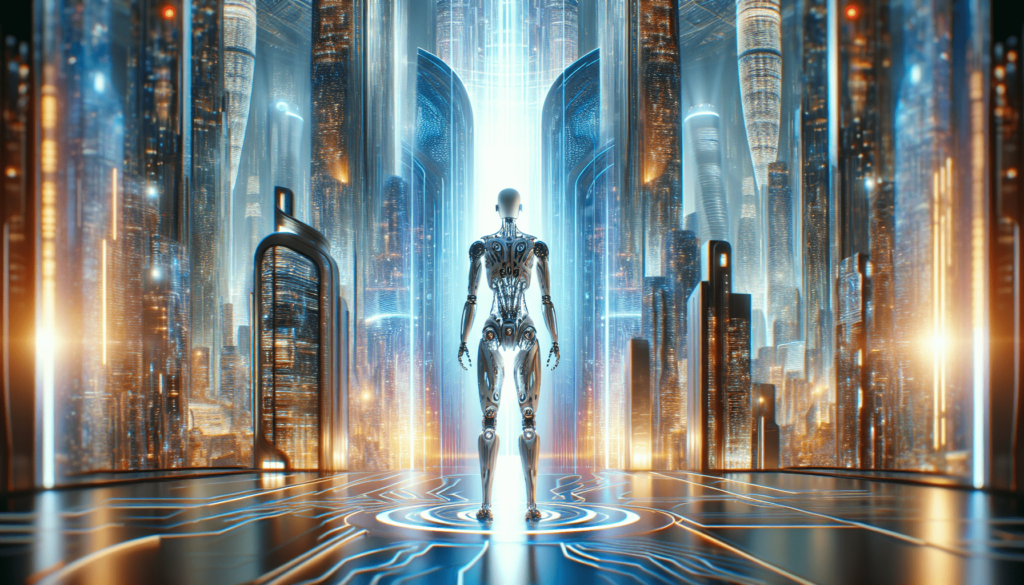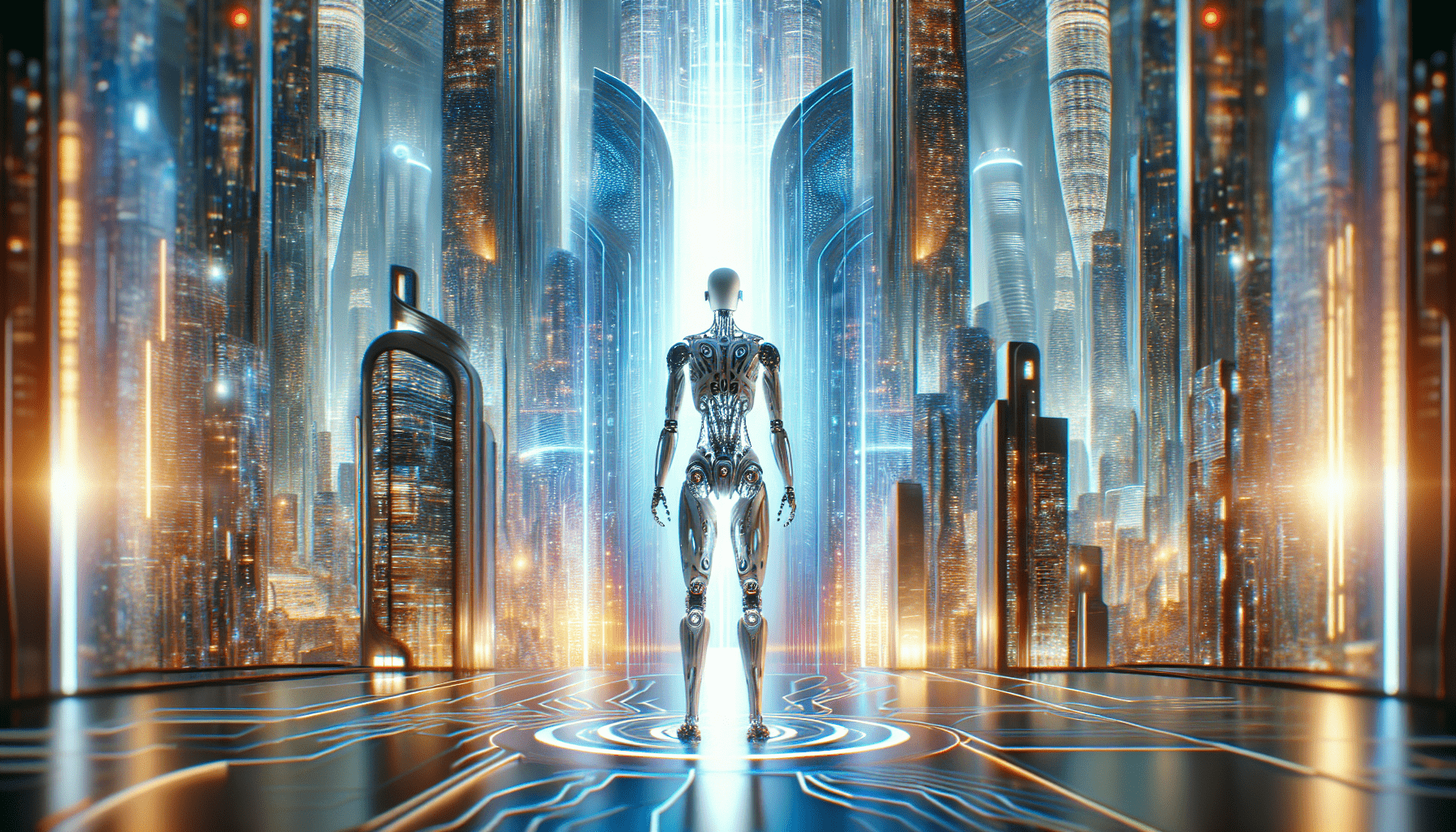Imagine a world where artificial intelligence is no longer confined to science fiction movies, but a reality that surrounds you every day. The future of AI holds immense potential, as it continues to transform various aspects of our lives, from healthcare to transportation to entertainment. This article explores the exciting advancements in AI technology and the possibilities it brings, promising to revolutionize the way we live, work, and interact in the years to come. So fasten your seatbelts and get ready for an exhilarating journey into the future of AI!

1. Introduction to AI
Artificial Intelligence (AI) is a branch of computer science that focuses on creating intelligent machines capable of performing tasks that typically require human intelligence. It involves developing algorithms and models that enable machines to think, learn, and make decisions. AI has become a prominent field of research and development, with countless applications across various industries.
Definition of AI
AI refers to the simulation of human intelligence in machines that are programmed to think and learn like humans. It encompasses a range of technologies, including machine learning, natural language processing, computer vision, and expert systems.
Brief history of AI
The concept of AI dates back to ancient times, with mythical tales of artificial beings brought to life. However, the modern field of AI was established in the 1950s when computer scientists began developing programs that could mimic human cognitive abilities. Over the decades, AI experienced periods of significant progress and setbacks, leading to the emergence of specialized branches like machine learning and neural networks.
Current state of AI
Today, AI is rapidly evolving and being integrated into various domains of society. From voice assistants like Siri and Alexa to self-driving cars and medical diagnosis systems, AI is reshaping the way we live and work. As technology continues to advance, AI is becoming more capable and sophisticated, leading to exciting opportunities and challenges.
2. Advancements in AI
AI has witnessed remarkable advancements in recent years, largely fueled by breakthroughs in machine learning and the availability of massive amounts of data. Let’s explore some of the key advancements in AI.
Deep learning
Deep learning is a subset of machine learning that involves training artificial neural networks with multiple layers to learn and make intelligent decisions. It has revolutionized various applications, such as image and speech recognition, language translation, and recommendation systems. Deep learning algorithms have achieved remarkable accuracy in complex tasks and continue to improve with increasing volumes of data.
Natural language processing
Natural language processing (NLP) enables machines to understand, interpret, and generate human language. It plays a vital role in voice assistants, chatbots, and language translation services. NLP techniques, including sentiment analysis and named entity recognition, are improving the accuracy and efficiency of language processing, leading to better user experiences and enhanced communication with machines.
Computer vision
Computer vision involves teaching machines to interpret and understand visual information from images and videos. Through the use of deep learning models and neural networks, computers can recognize objects, detect patterns, and perform tasks such as facial recognition and object tracking. Computer vision is finding applications in fields like autonomous vehicles, surveillance systems, and medical imaging, leading to advancements in safety, security, and diagnostics.
3. Applications of AI
AI has transformed various industries and is poised to continue its impact. Let’s explore some key applications of AI.
Healthcare
In healthcare, AI is revolutionizing diagnostics, treatment planning, and drug discovery. Machine learning algorithms are being used to analyze medical reports, predict disease outcomes, and recommend personalized treatment plans. Additionally, AI-powered robotic surgery systems are enhancing precision and reducing human error. AI has the potential to improve healthcare accessibility and efficiency, leading to better patient outcomes.
Finance
AI is driving innovation in the financial sector, with applications ranging from fraud detection and risk assessment to algorithmic trading and personalized financial advice. Machine learning models can analyze vast amounts of financial data, identify patterns, and make predictions. This enables financial institutions to streamline operations, optimize investment strategies, and provide tailored services to individual customers.
Education
AI has the potential to transform education by personalizing learning experiences and enhancing student engagement. Intelligent tutoring systems can adapt to individual student needs, providing real-time feedback and customized learning paths. Additionally, AI-powered virtual reality and augmented reality technologies can create immersive educational experiences, making complex concepts more accessible and engaging for students.
Transportation
AI is playing a crucial role in the development of autonomous vehicles, making transportation safer and more efficient. Machine learning algorithms enable vehicles to perceive their surroundings, navigate through complex environments, and make informed decisions in real-time. AI-powered traffic management systems can optimize traffic flow, reduce congestion, and enhance energy efficiency. The integration of AI into transportation has the potential to revolutionize urban mobility and improve sustainability.
4. Ethical Considerations in AI
As AI continues to advance, it is essential to address the ethical considerations associated with its development and deployment.
Bias in AI algorithms
AI algorithms are trained on historical data, which can contain biases. This can lead to the perpetuation of discriminatory behavior and exclusion of certain groups. It is crucial to ensure that AI systems are designed and trained with diverse and representative data to mitigate biases and avoid unfair outcomes.
Privacy concerns
AI relies on vast amounts of personal data to make informed decisions. This raises concerns about privacy and data protection. It is crucial to establish robust privacy frameworks and encryption techniques to safeguard sensitive information and ensure that AI systems only have access to relevant data with proper consent.
Unemployment and job displacement
AI and automation have the potential to disrupt traditional job markets, leading to job loss and displacement. It is essential to address the socio-economic impact of AI by investing in retraining and upskilling initiatives. Collaboration between humans and AI can lead to new job opportunities and increased productivity, but it requires proactive measures to mitigate negative consequences.

5. Challenges in AI Development
While AI holds immense potential, several challenges must be addressed for its successful development and deployment.
Lack of transparency
AI algorithms can be complex and difficult to interpret. This lack of transparency poses challenges in ensuring accountability and understanding the decision-making processes of AI systems. Efforts are being made to develop explainable AI models that provide insights into the inner workings of algorithms, promoting transparency and trust.
Data quality and availability
AI models heavily rely on high-quality and diverse data for effective training and decision-making. Ensuring data quality, accuracy, and availability can be challenging, particularly for domains with limited data sources or biased datasets. Accessible and ethically sourced data is essential to train unbiased and reliable AI models.
Regulatory and legal issues
The rapid advancement of AI has outpaced the development of comprehensive regulatory frameworks. This poses challenges in addressing legal and ethical concerns associated with AI systems. Governments and regulatory bodies need to establish guidelines and standards to govern the responsible development, deployment, and use of AI, ensuring transparency, fairness, and accountability.
6. Future of AI in Society
The future of AI holds immense potential for transforming society in various ways.
AI-enabled smart cities
The integration of AI technologies into urban environments can create smarter and more sustainable cities. AI-powered systems can optimize energy consumption, enhance transportation networks, and improve public services. From intelligent traffic management to automated waste management, AI-enabled smart cities can enhance the quality of life for residents while reducing environmental impacts.
AI in everyday life
In the future, AI is likely to become an integral part of everyday life. Voice assistants will become more intelligent and capable of performing complex tasks, such as managing smart homes and assisting in healthcare management. AI-powered wearable devices will monitor health parameters and provide personalized recommendations for well-being. Virtual reality and augmented reality technologies will create immersive experiences in entertainment, education, and communication.
Impact on industries
AI is expected to have a significant impact on various industries, driving innovation and transforming business models. From personalized marketing and customer service to predictive maintenance and supply chain optimization, AI can enhance efficiency, productivity, and customer experience. The integration of AI into industries such as manufacturing, agriculture, and retail will unlock new possibilities and disrupt traditional practices.
7. Artificial General Intelligence (AGI)
Artificial General Intelligence (AGI) refers to AI systems capable of understanding, learning, and performing any intellectual task that a human can. AGI represents a level of AI sophistication where machines possess a general intelligence on par with human intelligence.
Definition of AGI
AGI goes beyond specialized AI applications and aims to develop machines that possess human-like intelligence across a wide range of tasks and domains. It involves creating AI systems capable of understanding natural language, learning from experiences, and exhibiting creativity and problem-solving skills.
Potential risks and benefits
AGI presents both significant risks and benefits. On the positive side, AGI could help solve complex global challenges, such as healthcare, climate change, and poverty. It has the potential to accelerate scientific research and make breakthrough discoveries. However, there are concerns about AGI surpassing human intelligence and potentially becoming uncontrollable or acting against human interests. It is crucial to ensure responsible and ethical development of AGI to maximize its benefits while minimizing risks.
Progress towards AGI
Developing AGI is a complex and ongoing research endeavor. While significant progress has been made in specific areas of AI, achieving true AGI remains a challenge. Researchers are exploring various approaches, including reinforcement learning, neuro-symbolic AI, and computational cognitive modeling. Continued interdisciplinary research and collaboration are crucial for advancing AGI and understanding its potential implications.
8. Human-AI Collaboration
The future of AI lies not in replacing humans but in augmenting human capabilities and facilitating collaboration between humans and machines.
Augmented intelligence
Augmented intelligence refers to the use of AI to enhance human intelligence and decision-making. AI systems can assist humans by analyzing vast amounts of data, identifying patterns, and providing insights, enabling informed decision-making. From healthcare diagnosis to financial analysis, augmented intelligence can help humans make better-informed choices and improve overall performance.
AI-assisted decision making
AI can assist in decision-making processes by providing recommendations, predictions, and risk assessments. In complex scenarios, machines can analyze large volumes of data and consider multiple factors simultaneously, aiding humans in making more accurate and efficient decisions. However, human oversight remains crucial to ensure ethical considerations and to challenge potential AI biases.
AI and creativity
AI has shown potential in various creative domains, such as music composition, art, and design. Machines can generate original content, explore new possibilities, and inspire human creativity. Human-AI collaboration in creative fields can lead to novel artistic expressions and advancements in creative industries.
9. Forecasting AI Development
The future of AI promises exciting advancements and transformative changes. Several trends and predictions shape the trajectory of AI development.
Emerging trends in AI
Advancements in AI are fueling emerging trends, such as explainable AI, federated learning, and edge computing. Explainable AI aims to enhance the interpretability and transparency of AI systems, helping users understand and trust their decisions. Federated learning enables distributed machine learning models across multiple devices, preserving data privacy. Edge computing brings AI capabilities to the edge of the network, minimizing latency and enabling real-time applications.
Predictions and speculations
Experts predict that AI will continue to advance rapidly, with breakthroughs in areas like AGI, natural language understanding, and robotics. The integration of AI with other emerging technologies, such as quantum computing and blockchain, can unlock new possibilities. Speculations about the future of work suggest that AI will augment human capabilities rather than replace jobs entirely, leading to the emergence of new roles and industries.
AI in the next decade
In the next decade, AI is expected to become an even more pervasive aspect of society, touching nearly every industry and aspect of daily life. Autonomous vehicles will become more prevalent, transforming transportation systems. AI-powered virtual assistants will provide personalized experiences and support across various domains. Enhanced medical diagnostics and treatment planning will improve healthcare outcomes. The expansion of AI in sectors like agriculture, energy, and education will drive efficiency and sustainability.
10. Conclusion
Artificial Intelligence has come a long way from its inception and is poised to shape the future in profound ways. Its advancements in deep learning, natural language processing, and computer vision have revolutionized various industries. AI applications in healthcare, finance, education, and transportation hold immense potential for transforming our lives. However, ethical considerations, challenges in development, and the emergence of AGI require careful attention. Collaboration between humans and AI, with a focus on augmented intelligence and responsible decision-making, will be pivotal. As we look to the future, AI is expected to become increasingly integrated into our society, ushering in exciting possibilities and implications. It is crucial for individuals, organizations, and policymakers to navigate this technological revolution with mindfulness and foresight to harness the full potential of AI for the benefit of humanity.
